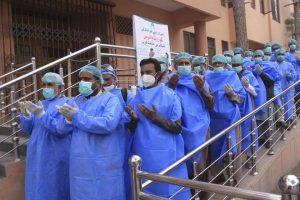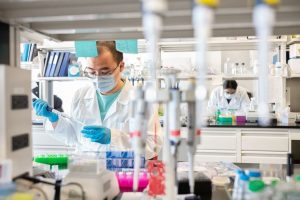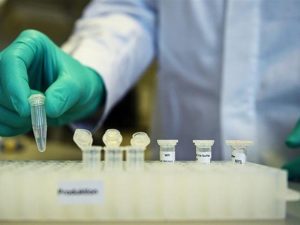What was the Global as well as National Scientific Response?
Scientists across the globe have been working very hard to dissect this virus. Its genome was sequenced in a matter of days, while countless labs and research group s have already put in everything they had in their quest to explore preventive and therapeutic options against this virus. All the human efforts by epidemiologists, microbiologists and clinicians, and experts from many other fields were brought together to work out the mode of transmission and to provide public-safety, hygienic and protective guidelines.

In special reference to Pakistan, universities tasked their faculties and students to design and innovate to deal with this pandemic. We have witnessed success in the development of testing kits from a couple of universities, many ingenious alternatives were presented in the face of sanitizer shortage. Even some robotics groups modified and/or designed drones and droids for spraying antivirals in high-risk areas without the need of putting the lives and safety of paramedic staff at risk.
What should have been done?
There are two aspects of this question, yet the roots lie with the leadership. The aim of this article is not to stir a political debate nor to criticize the government’s actions, nor do I intend to debate the timing and smartness of the lockdown. Yet one can take examples away from home to demonstrate one’s point. Let’s talk about Vietnam. Being the next-door neighbor to China with huge population exchange at the borders due to business and other reasons before the outbreak. As of 8th May 2020, not a single death is reported there. Selection of Vietnam is not by mistake nor could it be termed as a comparison between apples and oranges. Vietnam is neither a city-state like Singapore or Hong Kong nor its resources are bountiful. In fact, last year, Vietnam had GDP lower than Pakistan and almost half in contrast to Thailand’s. We need to learn from such examples.

For combating and controlling the viral spread, we need to have a unified national strategy. The shortcomings on the part of government and administration are; lack of coordination, downplaying the critical nature of situation and hesitation to impose stricter and more effective lockdown, the establishment of quarantine centers in areas without basic facilities, etc.
Coming towards the responsibilities of the scientific community, being a scientist with a fancy degree in the field of Biosciences, I believe we have been living inside a bubble for quite a while now. People around us don’t like it when we talk about science with them, and there’s a reason for that. We have been so absorbed in the environment inside of our academic bubble that when we talk to people who don’t share our domain, they find it difficult to comprehend what we are talking about. I have been to a few ‘Corona Awareness Seminars’ organized by universities for public awareness. All of the talks, except for the parts of sanitation and preventive hygiene, were scientific jibber-jabber for a man who doesn’t have a degree in biosciences.
To understand that SARS CoV2 is a positive-sense single-stranded RNA virus, one should be aware of fundamental concepts of Molecular Biology, Biochemistry & Virology. (Being a microbiologist myself, I have always resented molecular biology in my entire education). Trust me no one likes to know and memorize the fact that ‘How many nucleotides are there in the viral genome’. See again you need to know the aforementioned subjects just to understand the last sentence.
We, as scientists, need to connect with our people. We need to learn how to communicate with people around us who don’t have any knowledge of our fields and domains without boring them.
What measures should be taken for better preparedness of such incidences in the future?
Due to our region’s geostrategic and geopolitical reasons, we have always been a security state since independence. But this global pandemic has exposed our underbellies to the unconventional threats we are facing now and might be facing again in the future as well. In the first two decades of the twenty-first century, we as a global community have faced many epidemics i.e. SARS, MERS, Ebola, Zika and now Covid19 and if we go a little into recent past we can witness the fact that such epidemics are quite regular occurrences especially since the Spanish Flu.
The need for the establishment of a national network, mechanism, or a system for surveillance of bio-threats cannot be stressed anymore in our current circumstances. Such a mechanism needs to be provided with adequate resources especially learning from the case of Taftan, where we didn’t have any facilities and yet we established a quarantine center there. Such monitoring setup could be based on a collaborative effort between the National Institute of Health (NIH) and the National Disaster Management Authority (NDMA). Where NIH should maintain the facilities and resources for diagnostics and testing while NDMA (and subsequent Provincial PDMA’s) should be able to establish quarantine setups with desired basic facilities even at the remote areas of the country.
What are the bottlenecks for Science and Science Policy in Pakistan?
There are two main bottlenecks when it comes to science in developing countries like Pakistan; lack of Research and Development culture in industry and insufficient patronage from the government.
Our industry is stuck in a vicious circle; it doesn’t have sufficient resources to invest in innovative products that provide a competitive edge and yield handsome returns. Our national economy is capital driven where any investor, capitalist, or industrialist invests in any particular industry for only two reasons; firstly he/she has sufficient spare capital to invest and secondly he/she has some experience in that particular field. In case if this investment turns out to be successful the industrialist prefers education of business administration instead of focusing on his/her successor’s education in that particular technical domain. The primary effect of this choice is that we have people holding top floor offices who know how to run a business effectively but are unable to innovate. Unlike discoveries, Innovation doesn’t happen by mere luck or serendipity they require hard work technical knowhow of the field. These are the two factors that are hindering the transition towards a knowledge-based economy, where knowledge and innovation lead the way towards the future.

The second major bottleneck regarding the scientific development is the lack of appropriate patronage for scientists. Scientific development follows the money. The golden age of Islamic sciences during the Abbasids began due to Haroon ur Rasheed’s patronage for Madena tul Hikma project, which was later expanded by his son Mamon ur Rasheed and subsequent successors. The entire project was rooted in a minuscule act of patronage i.e. hefty reward for translation of exotic and unique foreign books and manuscripts in Arabic.
When I talk about patronage and money, I don’t mean an increase in research grants and funding for fancy equipment. Since the establishment of the Higher Education Commission under the leadership of Dr. Atta ur Rahman, the government of Pakistan has been pouring billions of rupees in these accounts. Yet we have not seen any commercially viable product coming from our universities. In my humble opinion, this patronage must aim to encourage our students to innovate and develop solutions for our local problems. These innovative students must be facilitated to establish businesses based on their innovative solutions.
Yes I am talking about entrepreneurship and again yes I am aware of the nationwide incubation programs, startup, and business plan competitions. Although these activities are doing good but at present these facilities and activities lack the desired focus towards science and research-based innovation. These activities encourage students or other participants to come up with a sound profitable business idea and a workable business plan with the least amount of investment and initial capital.
Let’s compare product development processes in sciences (e.g. biosciences about ongoing Covid19 outbreak) and computer and IT. The latter requires a comfortable office, a good quality internet connection, and people who can code, while on the other hand the bio-scientist needs a fully equipped lab even for very first steps of experimentation to be performed.
This is the key bottleneck that has to be addressed. Due to this challenge most of the applied research going on in our varsities does not translate into viable commercial products. We need to transform our graduates from job seekers to job creators, who can eventually employ their friends thus creating employment opportunities for our science graduates, in the meanwhile also establishing our biotech industrial base.
Public Policy & legislation
Until we develop our biotech industrial capacity (which is virtually nonexistent at the moment) we need to adopt certain measures that can help us in short and intermediate terms. Although our industrial sector is facing a huge crunch and is struggling to survive but it is not that underdeveloped in comparison to other developing countries. With properly coordinated policy it can be put to good use for focusing on immediate challenges (e.g. non-availability of Personal Protective Equipment PPE) which we need to import from other countries. As witnessed in this global pandemic, individuals and commercial and other entities are working on ventilator designs and spare parts to cope with national needs in this hour of crisis.
These efforts can be better organized and coordinated by having legislation similar to the US Defense Production Law. In the face of future such incidents, based on recommendations by Surveillance and Monitoring Network (managed by NIH and NDMA) the Central Command and Control Centre could direct the national industries to prepare what is required and how much quantities will be needed.
Overhauling the research and academia
Our academia is in a state of decay and disarray, not in terms of the number of graduates produced or degrees awarded but in terms of quality of education and the skill set the degree holders carry. Since the establishment of the Higher Education Commission, the government is pouring financial resources in universities and other research institutes across the country in the form of Research Grants and funding for Hi-Tech fancy equipment. Billions of rupees have been invested in these two areas alone, yet we have not seen the expected outcome as any viable commercial product coming from our universities.
With special reference to life sciences the situation is even bleaker Taq Polymerase is one of the most fundamental enzymes used in every single Molecular Biology lab everywhere in the world. It has been commercially produced since the early 1980s, and still after 40 years we are unable to produce a single unit of this enzyme in the country. We don’t produce Insulin, any of the therapeutic hormones, Interferons or antibiotics, etc. One can argue that these are ‘sophisticated bio-therapeutic products’ and may require a very highly skilled workforce and sophisticated equipment, but the reality is we are not producing low-tech bioproducts (i.e. biofertilizers and polymerase enzymes) either.

Academics are amassing research publications because these are required for their job security and promotion, while the students are building piles of dissertations, each year because those are their degree requirements. But all these efforts are not directed towards finding solutions to problems. This has to change. This research culture has to evolve and get out of this student-thesis-students-thesis vicious cycle.
We need to encourage our undergrad and grad students to innovate, and based on their innovations, established businesses. This is the sort of patronage that is vital if we need to quicken the pace of transition of our economy into a knowledge-based economy to meet up with the challenges of the 21st century.
As discussed earlier there are organizations, institutions, and incubation centers, etc. that are focusing on Entrepreneurship and they are working fine. But we need a specialized entrepreneurship program that focuses on scientific and technology startups, I am not arguing that every biotech or any other STEM major grade or postgrad student should be given seed money willy-nilly. No. Everyone must be taught how he/she can establish his/her business and must be provided with equal opportunity to compete and secure seed funding, mentoring and access to high tech equipment and facilities available in the public sector (may it be universities, research centers, or any other government organization). If we select only 10 startups each year and nurture them for the entire year I am confident that within the second year we will have no further need to import low tech bio-products.
The country needs a program like this for five years intending to help building less than or equal to 50 science-based startups (10 startups/year). Successful implementation of such a program has the potential to produce results similar to that of the establishment of the Higher Education Commission for higher education in Pakistan. If we truly wish to combat national and global catastrophes like Covid-19 then it is imperative that we start reforming Pakistan’s scientific front.


